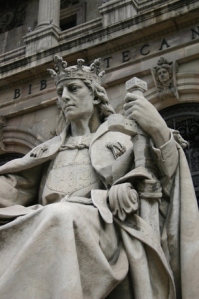 They came in the deep of night. “They always come at night,” my father said. “No need to worry though; they will also go away again by daybreak,” he added. He pointed out that the Jews have lived through episodes like this many times before and the seneschal was a trusted friend. Whether he really did not worry or just wanted to put my brothers and me at ease, I don’t know, but if he thought this was just another raid or that his friend, the seneschal, would stand by him, this time he was mistaken.
They came in the deep of night. “They always come at night,” my father said. “No need to worry though; they will also go away again by daybreak,” he added. He pointed out that the Jews have lived through episodes like this many times before and the seneschal was a trusted friend. Whether he really did not worry or just wanted to put my brothers and me at ease, I don’t know, but if he thought this was just another raid or that his friend, the seneschal, would stand by him, this time he was mistaken.
It was the night of Friday to Saturday, Shabbat, our day of rest. The hour of midnight had passed when a great commotion in the street awoke us.
“In the name of the king! In the name of the king!” Coarse shouts roared through the narrow, winding alleys of the Jewish quarter of Toulouse. e stomping of boots as from a hundred foot soldiers resonated on the pavement. Hoofs clanked on the cobblestones, swords rattled, the din reverberated in our hearts. An army of horsemen and foot soldiers moved from house to house, rousing the residents with merciless ferocity. Windows shattered, doors splintered under the force of ramming blocks. Our house was at the far end of the crammed quarter to which the Jews were relegated, and we waited with bated breath for the horde to reach us.
“Open up, in the name of the king! Open up!” To the confusion of noises were now added men’s voices, some we recognized as our neighbors’. All arguing was crushed with brutal force, with the hilt of the sword, the kick of the boot. Women’s shrieks and children’s cries raised the general din. To this day, I cannot forget how my heart raced and my body trembled as the king’s guardsmen drew closer to our abode. My father still put his faith in his friendship with the seneschal. Maybe he was aware of how serious the situation was and he merely tried to rein in our fears and keep his household from breaking out in a panic. When it was our turn, he walked with firm stride to the gate and opened it before any damage could be done. ere he stood in the gate of his house, robed in Shabbat white, a knit skullcap covering his head, his grizzled beard swaying as he repelled those intent on violating the sanctity of his property. His dignified bearing, the image of a prophet to my eyes, made my heart overflow with pride and love for the man who had raised me and surrounded me for the sixteen years of my life with his protective love.
“I demand to speak to his lordship, the seneschal,” he said with a resolute, calm tone as he barred the clamoring horde of guardsmen from entering our courtyard with his body.
“Hear that? is one wants the seneschal,” mocked one of the soldiers. But my father’s firm stance apparently gave him pause, and he did not try to push his way in. Nor did any of the others, especially since my brothers and several of our gentile servants joined now in blocking the entrance.
“In the name of the king! In the name of the king!” was all they could shout, and by then more meekly.
“The seneschal is a servant of his majesty, the king of France. I want to hear from him exactly what the king’s will is.”
The captain of the guard stepped up and made a respectful gesture toward my father.
“Don Elazar,” he said, “we are simply here to carry out the king’s orders. All members of the Israelite community are to be taken from their homes to the town’s dungeon. at’s all I know.”
“But why? ere must be an explanation, a reason for this sudden nocturnal assault,” my father insisted.
“Sorry,” said the captain. “We were not given any reason.”
The captain spoke with a certain tone of regret and even respect. He had known Don Elazar ben Simeon de Sola e Lunel for a goodly number of years. He had witnessed many times the yearly event when my father, as one of the elders of the kahal of Toulouse, presented himself on the Thursday of Holy Week at the cathedral door with a tax of thirty pounds of wax. On this occasion, it was also the custom for the townsfolk to box that Jew’s ears to remind him of the Jews’ guilt for the crucifixion. is was a popular local custom, going back to the time of the early Crusades, a sporting event for which half the town turned out. e fortitude and dignity with which my father bore the insults and abuse meted out by the good people of Toulouse had gained him a certain respect among the magistrates and guardsmen who surveyed the proceedings and made sure the mob did not get out of hand.
“Go get the seneschal!” the captain ordered one of his men.
The seneschal came, but he too had no explanation. Orders of the king! There was nothing to be done.
Meanwhile, our brethren with their wives and children were being shackled and led away, one by one, into another Babylonian captivity. So it seemed to me.